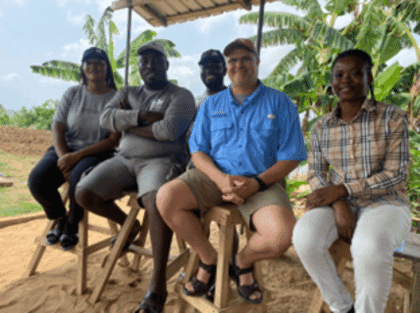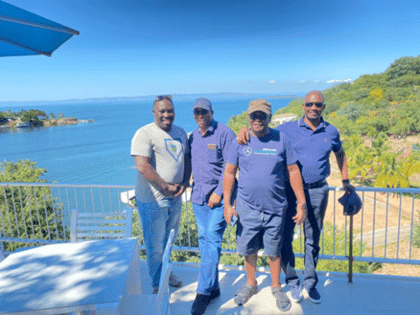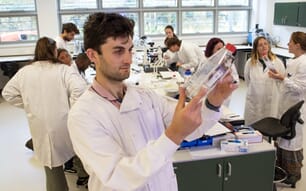
The programme provides an 8-week practical training at a modern tilapia farm for aquaculture graduates, which provides them with a crucial practical preparation for work on fish farms. The interns are provided with a stipend during their training, and their trainer assists them to transition to the work environment of their choice.
“The programme seeks to plug an important gap in the optimisation of aquaculture in Ghana and, indeed, many African countries. Quite a number of graduates have been produced in the tertiary institutions, but they have not been able to make a major contribution to the work on the farms, due to their lack of practical skills,” said Dr Jeff Terhune, a consultant to the programme.
“Flosell is one of Ghana’s most efficient fish farms, run along modern lines. This programme is particularly designed to impart skills which complement what was taught in the university, and make an impact on the farm. Many Ghanaian fish farms would be positively impacted by the quality of interns coming out of this programme. I also think this programme is important as it will inform similar programmes planned for other African countries,” he added.
Last October, ASA/WISHH ran a course for technical personnel from fish farms drawn from Senegal, Togo, Tanzania, Burkina Faso and Ghana, also at Flosell Farms, at which participants learnt the use of modern equipment in the maintenance of sound fish health.
As Dr Terhune said: “African fish farmers are, quite rightly, concerned about the cost of fish feed, because it takes over 70 per cent of their budgets. But they need to prioritise management, and do this they need essential, practical skills. As we assist them to upgrade the level of skills among their personnel, we should expect them to avoid some of the diseases that have caused havoc in recent times, and see better fish production figures’.
Jennifer Sodji-Tagbor, president of the Ghana Aquaculture Association, added that “this programme will address a major challenge in the industry. Although we need trained personnel on the fish farms, there have been problems with fresh graduates, because whilst most of them are keen to get jobs and earn some decent money, the farmers have found them lacking in certain important skills. So we are happy that from now, our graduates will have the benefit of guided internships in reputable farms where they can learn modern skills and, crucially, experience the application of modern gadgets and methods. The improvement of management practices, especially fish health, is our priority today, because quite a number of the challenges we have faced in recent times, especially diseases which have caused substantially mortalities, could have been avoided or effectively managed with better management. We are prioritising training in our activities. We really value the expertise which ASA/WISHH is providing.”
Davida Oben Mensah, an intern who graduated from the Department of Aquaculture at the Kwame Nkrumah University of Science and Technology, said: “I am enjoying the experience of participating in the management of broodstock, raising of fingerlings and juveniles and their transfer to grower ponds and cages. I have also joined the sales and marketing people with the sorting, de-gutting and packaging of the fish for sale. This is a big, modern farm, with modern equipment. By the time I leave here, I would be fully equipped. My preference is marketing though. I believe there’s work to be done in the establishment of a stable price for tilapia and catfish in Ghana.”
And Henrietta Pantoah, a graduate of the University of Development Studies, Tamale, said that “there are quite a number of recently established small farms in the northern regions where the personnel lack practical skills for managing water levels, temperature and for ensuring bio-security. My plan is to join two other mates to provide management services for small farmers in the region”.
Flossell set for international expansion
Meanwhile, Flosell Farms is gearing up to start operations in Zambia and Rwanda.
As CEO Evans Danso, explained: “After intensive preparatory activities covering the last couple of years, we should start the Zambia operation, to be named Two River Fish Farms, (TRFF) by the end of this year, and the Rwanda operation, Kariba Farms, will start operating next year.
According to Danso, the two farms are "collaborations between Flosell and a few personalities in Zambia and Rwanda with considerable interest in investment and the potential of aquaculture to drive the economies of the two countries through East Africa".

TRFF, an $8 million operation, will be initially be based in 10 floating cages, in Lake Itezhi Tezhi in Chief Shimbizhi Choongo district. It is due to start operations by the close of the year, with an initial annual production target of 500 tonnes of tilapia, which will be scaled up to 2,000 tonnes in a couple of years. Kariba Farms, he said, will be based in Lake Mahezi and will start operation early next year with an initial production target of 500 tonnes.
“These are only modest targets. There is great aquaculture potential in both Zambia and Rwanda, and we could go well beyond these targets in a short space of time. Apart from production of tilapia and catfish, we are also looking closely at possibilities in processing. We will not miss any opportunities to engage in processing, especially with the export market in view,” he said.




